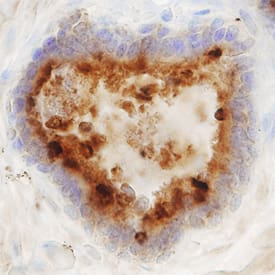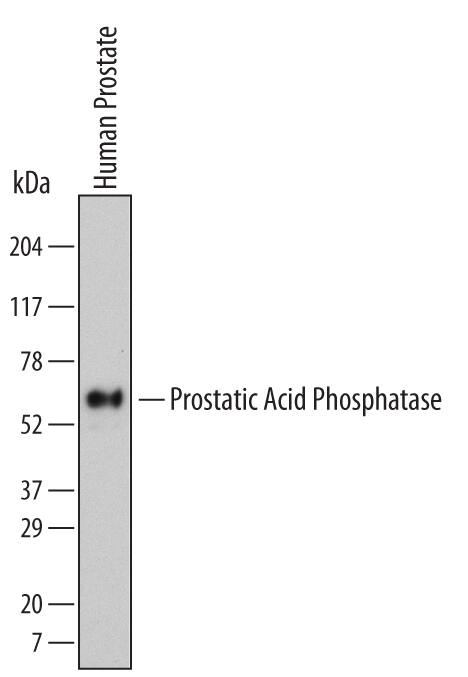Human Prostatic Acid Phosphatase/ACPP Antibody
R&D Systems, part of Bio-Techne | Catalog # MAB6240

Key Product Details
Species Reactivity
Validated:
Human
Cited:
Human
Applications
Validated:
Immunohistochemistry, Western Blot
Cited:
Western Blot
Label
Unconjugated
Antibody Source
Monoclonal Mouse IgG1 Clone # 690017
Product Specifications
Immunogen
Mouse myeloma cell line NS0-derived recombinant human Prostatic Acid Phosphatase/ACPP
Lys33-Gln379
Accession # P15309
Lys33-Gln379
Accession # P15309
Specificity
Detects human Prostatic Acid Phosphatase/ACPP in direct ELISAs and Western blots.
In Western blots, no cross-reactivity
with recombinant human TRACP/ACP5 is observed.
Clonality
Monoclonal
Host
Mouse
Isotype
IgG1
Scientific Data Images for Human Prostatic Acid Phosphatase/ACPP Antibody
Detection of Human Prostatic Acid Phosphatase/ACPP by Western Blot.
Western blot shows lysates of human prostate tissue. PVDF Membrane was probed with 2 µg/mL of Human Prostatic Acid Phosphatase/ACPP Monoclonal Antibody (Catalog # MAB6240) followed by HRP-conjugated Anti-Mouse IgG Secondary Antibody (Catalog # HAF007). A specific band was detected for Prostatic Acid Phosphatase/ACPP at approximately 55 kDa (as indicated). This experiment was conducted under reducing conditions and using Immunoblot Buffer Group 1.Prostatic Acid Phosphatase/ACPP in Human Prostate.
Prostatic Acid Phosphatase/ACPP was detected in immersion fixed paraffin-embedded sections of human prostate using Human Prostatic Acid Phosphatase/ACPP Monoclonal Antibody (Catalog # MAB6240) at 15 µg/mL overnight at 4 °C. Before incubation with the primary antibody, tissue was subjected to heat-induced epitope retrieval using Antigen Retrieval Reagent-Basic (Catalog # CTS013). Tissue was stained using the Anti-Mouse HRP-DAB Cell & Tissue Staining Kit (brown; Catalog # CTS002) and counterstained with hemotoxylin (blue). Specific staining was localized to the cytoplasm of epithelial cells. View our protocol for Chromogenic IHC Staining of Paraffin-embedded Tissue Sections.Applications for Human Prostatic Acid Phosphatase/ACPP Antibody
Application
Recommended Usage
Immunohistochemistry
8-25 µg/mL
Sample: Immersion fixed paraffin-embedded sections of human prostate
Sample: Immersion fixed paraffin-embedded sections of human prostate
Western Blot
2 µg/mL
Sample: Human prostate tissue
Sample: Human prostate tissue
Formulation, Preparation, and Storage
Purification
Protein A or G purified from hybridoma culture supernatant
Reconstitution
Sterile PBS to a final concentration of 0.5 mg/mL. For liquid material, refer to CoA for concentration.
Formulation
Lyophilized from a 0.2 μm filtered solution in PBS with Trehalose. *Small pack size (SP) is supplied either lyophilized or as a 0.2 µm filtered solution in PBS.
Shipping
Lyophilized product is shipped at ambient temperature. Liquid small pack size (-SP) is shipped with polar packs. Upon receipt, store immediately at the temperature recommended below.
Stability & Storage
Use a manual defrost freezer and avoid repeated freeze-thaw cycles.
- 12 months from date of receipt, -20 to -70 °C as supplied.
- 1 month, 2 to 8 °C under sterile conditions after reconstitution.
- 6 months, -20 to -70 °C under sterile conditions after reconstitution.
Background: Prostatic Acid Phosphatase/ACPP
Alternate Names
ACP3, ACPP
Gene Symbol
ACP3
UniProt
Additional Prostatic Acid Phosphatase/ACPP Products
Product Documents for Human Prostatic Acid Phosphatase/ACPP Antibody
Product Specific Notices for Human Prostatic Acid Phosphatase/ACPP Antibody
For research use only
